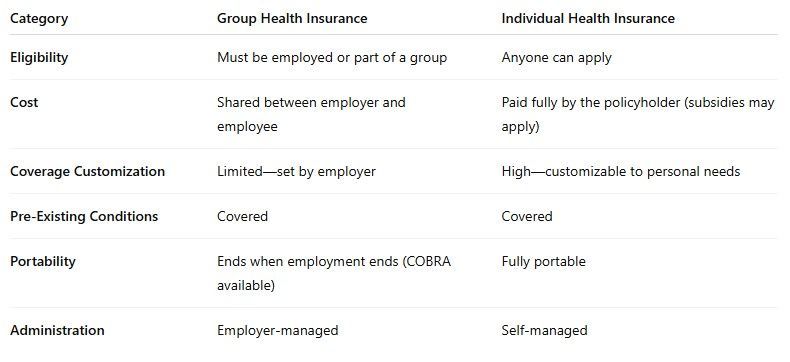
Health insurance plays a vital role in protecting both your health and your financial well-being. Whether you’re an employee receiving coverage through your job or someone shopping for your own plan, understanding the difference between group and individual health insurance is essential. Each type of coverage offers unique benefits, costs, and eligibility requirements that can significantly affect your access to care and overall expenses.
Understanding the Basics
Before diving into the differences, it’s important to understand what each type of insurance means:
Group Health Insurance
Group health insurance is typically offered by an employer or organization to a group of people, such as employees and their dependents. The employer selects the plan (or a range of plans), negotiates rates, and shares the cost of premiums with employees.
Key traits of group health insurance:
- Offered through an employer or membership organization
- Premium costs are shared between employer and employee
- Usually offers guaranteed coverage for eligible employees
- Often includes broader benefits and network options
Individual Health Insurance
Individual health insurance is purchased directly by a person or family, rather than through an employer. These plans are commonly available through the Health Insurance Marketplace or private insurance companies.
Key traits of individual health insurance:
- Purchased by individuals or families directly
- Premiums are paid entirely by the policyholder (though subsidies may apply)
- Customizable to meet personal needs and preferences
- Available to anyone who qualifies based on open enrollment or special enrollment periods
Major Differences Between Group and Individual Health Insurance
Let’s break down the key distinctions that set these two coverage types apart.
1. Eligibility and Enrollment
- Group Insurance:
Eligibility is tied to employment or membership in a qualifying organization. Once you join the company, you can usually enroll during your onboarding period or during the company’s annual open enrollment.
- Individual Insurance: Anyone can apply during the federal open enrollment period or after a qualifying life event (like losing job-based coverage or moving to a new state).
2. Cost and Premium Sharing
- Group Plans: Employers typically pay a significant portion of the premium—often between 50% and 80%—making group coverage more affordable for employees.
- Individual Plans: You pay the entire premium yourself, but subsidies and tax credits under the Affordable Care Act (ACA) can reduce costs for those who qualify based on income and household size.
Example:
If you live in Houston, Texas, your employer might cover 70% of your group health premium. However, if you’re self-employed, you could explore individual plans on the Texas Health Insurance Marketplace and potentially qualify for tax credits based on your income level.
3. Coverage and Plan Customization
- Group Insurance: Plans are chosen by the employer, which means employees have limited say in coverage details. Most plans include comprehensive benefits like preventive care, hospitalization, prescriptions, and sometimes dental or vision coverage.
- Individual Insurance: Offers greater flexibility. You can choose coverage levels (Bronze, Silver, Gold, Platinum tiers on the Marketplace) and add options like telemedicine or expanded networks, depending on your needs and budget.
4. Underwriting and Pre-Existing Conditions
- Group Plans: All eligible employees can join regardless of health status. Pre-existing conditions cannot affect eligibility or pricing under the ACA.
- Individual Plans: Also must cover pre-existing conditions under federal law, but pricing is based on factors such as age, location, and tobacco use—not medical history.
5. Plan Portability
- Group Insurance: Coverage typically ends when you leave your employer, though temporary continuation through COBRA is possible (usually for 18–36 months).
- Individual Insurance: Portable and not tied to employment—you can maintain your plan even if you change jobs, move, or retire.
6. Administrative Simplicity
- Group Plans: The employer handles most of the administration, including premium payments, enrollment, and compliance.
- Individual Plans: You manage your own enrollment, payments, renewals, and paperwork. This gives more control but requires personal responsibility.

Which Type Is Right for You?
Choosing between group and individual health insurance depends on your circumstances:
Choose Group Coverage if:
- Your employer offers a plan with good cost-sharing and benefits.
- You prefer minimal paperwork and automatic payroll deductions.
- You want access to robust coverage options with potential employer perks.
Choose Individual Coverage if:
- You’re self-employed, between jobs, or your employer doesn’t offer insurance.
- You need specific coverage options not available through your workplace.
- You value flexibility and portability across states like Texas or beyond.
The Role of State and Local Factors
State laws and insurance markets can influence coverage options, provider networks, and premium rates. In Houston, Texas, for instance, residents can explore competitive options through both employer-based and individual plans regulated under Texas insurance laws. Local insurance agents and brokers can help compare rates and networks across multiple carriers to find a plan that fits your healthcare and budget needs.
Final Thoughts
Both group and individual health insurance provide essential protection, but the right choice depends on your personal situation, employment status, and financial goals. Group plans offer convenience and shared costs, while individual plans deliver flexibility and independence.
Understanding these differences ensures you can make informed decisions about your healthcare—whether you’re choosing coverage through your employer or shopping for the right policy on your own in Houston, Texas.
At Wheatstone Benefits Group, LLC, we aim to provide comprehensive insurance policies that make your life easier. We want to help you get insurance that fits your needs. Get in touch with our company at (713) 470-0222 to learn more about our offerings. Today, by CLICKING HERE, you may get a free estimate.
Disclaimer: The information presented in this blog is intended for informational purposes only and should not be considered as professional advice. It is crucial to consult with a qualified insurance agent or professional for personalized advice tailored to your specific circumstances. They can provide expert guidance and help you make informed decisions regarding your insurance needs.










